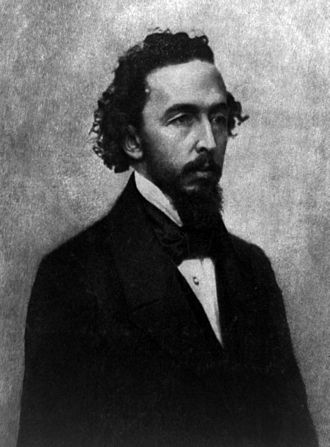I’ve just finished narrating the full first part of Goethe’s Faust. This was very enjoyable to narrate, and it has a lot to do with the translation I’ve selected.
Since this is a German work, the quality of the reading very much depends on the translation. And Bayard Taylor’s translation far surpasses the ones I’ve checked.
He translated Faust in 1870 and released it in 1871. It was one of the last translation works that he undertook. Here is the picture of the translator:

I found the work very easy to comprehend, though it was written in old English. Of course, narrating it was another matter. It was quite difficult, but very enjoyable.
Faust was written between 1806 and 1831. I absolutely love reading such old works, as they always reflect how people lived in the past, what their beliefs and culture were.
When reading old works, it’s easy to find the limitations of the viewpoint of authors. Many of them are clouded with Catholicism or false notions of the time. But when reading the works of those who were spiritually above the masses, they remain universal always, just with the garb of a particular age.
This applies to Faust. The work is obviously of the past ages, but the truths in it are universal.
Gothe was obviously familiar with magic, elementals, and how the evil forces work. It wasn’t his imagination at all (as some people interpret) but an ability to see into the nature with spiritual eyes.
I’m just now reading the second part of the book, so my view of the purpose of the work may change. But now I see the purpose of Faust as to warn people to never get friendly with dark forces because you may overestimate yourself.
You may think that you’re spiritually advanced, so such forces can’t hurt you and you can use them; but such forces have seen many people like you, and they will teach you a hard lesson.
They may make you commit the worst misdeeds so quickly that when you look back, you’ll see a trail of destruction behind you: crimes and broken lives.
The first part of Faust teaches to never give up on God. You may be very close to illumination, and that’s when your faith can be faint, as you don’t realize you’re on the brink of the light. You may think you’ve been working so hard to reach the truth, and yet the results are so small.
That’s when the evil forces can tempt you to turn away from your lofty pursuits and to plunge into the passions of the world, so as not to miss out. And if a high soul turns away, it can fall very low.
Faust also teaches the damage of a bad friendship. Margaret may have not done what she did if she didn’t have Martha by her side to advise her. Faust would not have let Mephistopheles in disguised as a dog save not for his friend’s advice.
Faust would not have caused shame, and the final undoing of Margaret would not for the urgings of Mephistopheles.
***
Because of Bayard Taylor’s wonderful translation, I could feel the beauty and depth of the work. The characters vividly arose before me, and it was a better entertainment than any movie.
Some parts of the book are hilarious – these days you don’t get many writers who had mastered the pen so well.
Past works were written for decades, and the same applies to other art, such as painting. Now, works are produced in a day, a month, a year. So, of course, it’s hard to compare today’s works with those of the past.
I’ve searched for newer translations of Faust too, but I didn’t find a poetic, beautiful and flowing language like that of Bayard Taylor’s translation. So I stuck to it in my narration of Faust.
I highly recommend reading or listening to this work if you haven’t done so, or if you did it only at school. Reading it after many years, you will have a much better ability to perceive its value.
I also recommend this work for those who want to understand how evil forces work, or who want to feel the culture and worldview of the people of the past, as Goethe describes many interesting characters throughout the book.
